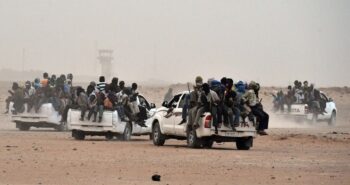By Barah Mikail

It will still be a long time before Libyans stop paying the price of a malicious international game that grapples with the inability of their leaders to look beyond their own interests.
In June 2019, a delegation of politicians, journalists and experts from various European countries visited Tripoli.
This trip, in which I participated, was organized on the initiative of the International Center for Relations and Diplomacy (ICRD), in partnership with the Foresight and Security Institute in Europe.
The delegation was able to meet with many mayors, members of political parties, representatives of civil society organizations and institutional personalities of the country.
These include Prime Minister Fayez al-Sarraj, the head of the United Nations Support Mission in Libya Ghassan Salamé and the President of the High Council of State Khaled al-Mishri.
Visiting Tripoli in spite of the prevailing bellicose situation between Western militias under the Government of National Accord (GEN) and the Libyan National Army (ANL) commanded by Marshal Khalifa Haftar is a recommended exercise.
This even if such a trip is not enough to reflect what prevails on the whole country. Because Libyan society is extremely polarized.
Nevertheless, talking with people in western Libya, listening to their grievances and observing life as it is organized on a daily basis provides valuable insights into the situation in this particular part of the country.
We also realize the magnitude of the chasm that separates the reality from the facts as told by many media.
Tripoli is much safer than what is said
No doubt is possible: Libya is in a war situation. At the beginning of April 2019, Marshal Khalifa Haftar did indeed start hostilities by attacking Tripoli, which he was planning to seize.
It had been about a year since rumors had evoked this offensive. But nobody knew exactly when or if it would materialize.
A few weeks before the attack, Khalifa Haftar appeared to have taken control of the Fezzan region in the south. It turned out that he had at the same time approached some militias based in western Libya to ask them to help him seize the capital, either actively or by displaying their neutrality.
Those who promised to help would betray him and eventually support the Government of National Accord.
According to the media, Tripoli is in the grip of a fierce war , chaos and fear prevail.
Things are more nuanced.
The Government of National Accord and the Libyan National Army are indeed engaged in a war.
But their fighting is concentrated on the southern and eastern outskirts of Tripoli, while the respective contingents involved in these hostilities are limited in number.
Overall, the attacks are concentrated around Tripoli International Airport, the administrative borders of the south of the capital, and around Tarhouna, Gharyan and some areas that are peripheral to them.
Some 600 people have died since the beginning of the Tripoli offensive in early April 2019. Fifty of them are civilians; there are more than 3,000 injured; but equally worrying is the number of people displaced by the conflict, which totals some 90,000 people.
All of this must be taken seriously. But we remain far from the apocalyptic situation that so many people, starting with the inhabitants of Tripoli, generally evoke.
An extremely unpopular France
The fall of Gaddafi in late 2011 was good news. Nevertheless, the Libyans have suffered a lot since then.
They were optimistic about the possibility for their country to open a new page in its history.
Eight years later, the country is still at war.
None of the events since 2011 can be read independently of the issue of foreign interference, starting with the fall of Muammar Gaddafi.
At the time, a coalition of almost 20 countries, under the aegis of NATO, or in cooperation with it, had worked towards this goal.
Among them were the United States, the United Kingdom, Italy, Qatar, the United Arab Emirates and France.
Libyans may have since distanced themselves, or changed their point of view, over these countries. However, the resentment of Western Libyans against the states that today support Khalifa Haftar is undeniable.
The United Arab Emirates, Egypt, Saudi Arabia and France are doomed to commiseration, as is the United Nations Support Mission in Libya, criticized for not adopting a clear position.
The four countries mentioned above support Khalifa Haftar, each in his own way.
But while the first three of them do so without ambiguity, France is proving to support both Khalifa Haftar and the “internationally recognized government” of Fayez al-Sarraj.
Western Libyans reject this contradiction.
Many of them see that any person or country supporting Khalifa Haftar is a traitor who has to pay for his actions.
Examples such as the death of members of the French special forces in Libya in 2016 or the arrest of French spies supposed to the Libyan-Tunisian border in April 2019 reflect in their eyes an abusive attitude of Paris.
France is not welcome in western Libya; French people in general are criticized or even rejected. This is the logical consequence of the ambiguous attitude of France in Libya.
Reasons for failure
It is widely believed that Libya did not experience peace because of foreign interference.
This remains to be demonstrated. External interference in Libya has fed on the political vacuum that followed the fall of Muammar Gaddafi. But it does not mean that without these interferences, Libyans could peacefully agree on the terms of a political project.
There is a general feeling that external interference is imposed on the countries that are the object of it.
The opposite is true in Libya.
Khalifa Haftar depends on strong foreign support, it is even for him a question of political survival, but it is also a choice on his part.
Similarly, Fayez al-Sarraj inherited a situation that existed prior to his coming to power in 2016.
In 2011 already, Qatar and Turkey were the assertive supporters of actors who had accepted their support, and who would end up constitute the first official government of Libya (2011-2012) then the National General Congress (2012-2016).
Fayez al-Sarraj and Khalifa Haftar are equally dependent on sponsors and suppliers of foreign arms.
Moreover, the militias that support the Prime Minister do so on the basis of their rejection of Khalifa Haftar, not by adherence to Fayez al-Sarraj. The day the Libyan conflict ends, inter-militia disputes will soon resurface.
On the future
Is it still possible to believe in a bright future for Libya? Not in the short term anyway.
The country is experiencing a low intensity conflict, which is confined to the eastern and southern suburbs of Tripoli.
The stalemate will continue to prevail, provided at least the actors do not have access to more sophisticated military technology or weaponry.
In the end, the protagonists of the Libyan game can be expected to return to the dividing lines that still prevailed in January 2019, before Khalifa Haftar entered southern Libya.
Only a return to these lines would be acceptable by each party, this situation allowing them to save appearances by showing that they would not have suffered significant geographical losses.
Keeping face would also allow these actors to more easily agree to the idea of reopening a political process.
The problem is that none of the Libyan protagonists will agree to address the other anytime soon.
Fayez al-Sarraj has just launched a political initiative that does not include Khalifa Haftar. He dreams of being able to deal with other interlocutors from the east.
However, in doing so, the Libyan Prime Minister does not change the reality of the facts. Unless the population of Cyrenaica rises against Khalifa Haftar, he will remain the strongman of the East.
In other words, we go back, slowly but surely, to square one, namely a situation where east and west each have their government, while the militias make their own law on the ground.
The divisions of the international community continue to be at the origin of the main Libyan troubles. And it will be a long time before the Libyans stop paying the price of a malicious international game that is grafted on the inability of their leaders to look beyond their own interests.
***
Barah Mikaïl is director of Stractegia, a center based in Madrid dedicated to research on the North Africa – Middle East region as well as the political, economic and social perspectives in Spain.
___________





